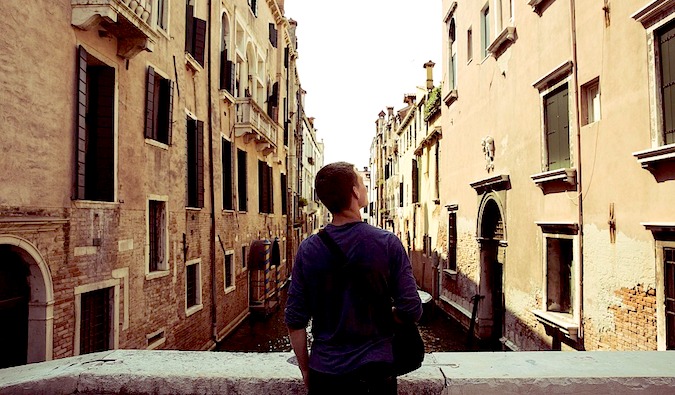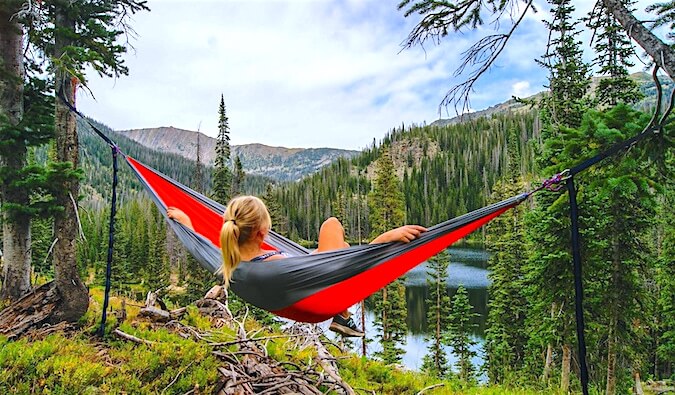
Last Updated: 7/10/23 | July 10th, 2023
One of the most common questions I get asked about my ability to travel long-term is how I can afford to travel so much.
Am I rich? Did mom and dad pay? Do I have a rich uncle? Did I win the lottery?
Before I was able to transform this blog into a business, I spent years traveling the world by doing one thing: I kept track of my spending.
That’s really the secret to long term travel: really good money management.
Simple and boring.
Yes, you have to save money before you go (or work overseas to keep refilling your bank account) but long-term travelers are just really good at money management because you have to make a limited resource (your bank account) last a long, long time.
When I first started traveling, I pinched every penny and saved money every chance I got. While I sometimes lavishly spent money like it was going out of style, I made up for it on other days by staying in and cooking pasta. (After all, did you live like a pauper at home to go to Australia and not dive the Great Barrier Reef? Of course not! You have to live a little sometimes!)
I kept a journal of what I spent so I could track my spending and be sure I was staying on budget. (Side note: I love when I see travelers keeping a spending journal to track their budget. Those are the travelers who end up staying on budget!)
While on the road (just like at home), there will be unforeseen circumstances that chip into your savings, like missed flights, a lost camera, or a change in plans that leaves you having to pay extra for accommodation (which is why you have travel insurance so you get these costs covered). You can’t avoid these sorts of things, but you can be prepared.
To help you make your money last on the road, here are the strategies that have helped me make my money last:
1. Know what you want to spend money on
When I travel, I don’t budget a lot of money for accommodation, tours, or transportation. I find the cheapest accommodation around and I walk everywhere. If I need a ride, I’ll take public transportation or hitchhike!
But I will spend a lot of money on food and drinks.
Why?
Because that’s what I want to do!
I didn’t pinch pennies back hom so I could fly to Australia and spend my nights watching Netflix, nor did I head to France just to cook meals in a hostel every night.
No, not me. I came to eat and drink.
And I’m willing to sleep in massive dorms, on a floor, or walk seven miles to ensure I have the funds to make that happen.
Knowing what you want to spend money on will help you create a realistic budget based on your travel desires so you have enough money for what you want and don’t feel guilty about spending money on it. I see a lot of travelers blow through their budget quickly because they didn’t prioritize their spending.
2. Create Your Budget
When you know yourself and what you want to spend money on, it’s easy to create a budget that will cover you for the duration of your trip. This is where pre-trip research comes in.
When I started planning my trip in 2005, there wasn’t a lot of travel information online. I spent a lot of time reading guidebooks and searching for any information I could find about prices. I pieced together an intricate spreadsheet of how much I would spend each day in various places based on how much I could save and what I found online.
These days, you don’t need to go that crazy when you plan your trip because there is so much information available online about prices. You can literally Google the price for anything you want!
Too often I see travelers get blindsided by unexpected costs.
“Wow! That tour is so expensive. I blew my budget!”
“I didn’t expect drinks would cost so much!”
“This place is more expensive than I thought.”
I just shake my head when I hear these comments, because these are people who clearly didn’t do any planning.
Don’t be like these people. Do your research, plan ahead, and avoid the pitfalls that will send you home far sooner (and far poorer) than you want.
My travel guides to over 300 destinations are a good place to start.
Write down all the things you want to do, where you want to do them, and how much they will cost. Account for your food, insurance, transportation, flights, accommodation, booze, activities, and anything else you think will be relevant.
(Note: I am not going to get into how to save for your trip in this post. But I have tons and tons and tons of posts on how to do that. You can find them here.)
3. Keep track of all your expenses
While on the road, you need to track all of your expenses. The people who have to go home early are always the ones that have no idea how much money they are spending on the road.
By tracking every expense — from hostel dorms to that snack you bought — you can see if you’re on track or if you’re overspending (in which case you can correct your spending).
This is the most important thing you can do to make your money last!
If you only do one thing, track your spending! Sure, you have to remember to do it, and it’s easy to forget, but actively doing this will ensure you become a better budget traveler, and soon it will become a habit.
You can keep track of it all in a journal (I use a Moleskine notebook) or use an app like:
I suggest tracking your expenses for a few weeks at home before your trip to get in the habit. That way, when you’re on the road, it won’t feel like a chore. Here are some free budgeting templates you can use to get started.
4. Travel for free
As I’ve said, making your money last is really about setting your budget, saving money, and tracking your expenses on the road. But another great way to make your money last is to not spend it. And there’s a lot of ways to do that.
First, you can always work when you travel. There are a lot of jobs out there for travelers. And you can always work on a farm via WWOOFing, which is a great cultural experience that many travelers do.
Second, you can use the sharing economy to lower costs. You can stay with people for free, rideshare, and so much more. Sharing economy websites and apps connect travelers with locals and bypass the traditional travel gatekeepers. Now only do you save money but you get to meet locals!
Third, use points and miles. The best travel is free travel and collecting points and miles can allow you to get free flights, transportation, and accommodation. You can do this before you travel and while on the road via your everyday spending.
I’ve written extensively on this topic. It’s the #1 way I travel so much for so little. Download my free guide to learn more!
Your budget will only last as long as you planned it to last. If you plan your budget well, it will last until the end of your trip. So, no matter what you do, write down your expenses!!! Keeping track of your expenses will allow you to make adjustments as you go and ensure that your travel money lasts as long as you want.
By planning and tracking like a financial ninja, those things are not likely to happen. That means more days on the road, more adventures, and more awesome travel experiences.
The better you know yourself and create a budget based on that, the longer your money will last when you travel!
Book Your Trip: Logistical Tips and Tricks
Book Your Flight
Find a cheap flight by using Skyscanner. It’s my favorite search engine because it searches websites and airlines around the globe so you always know no stone is being left unturned.
Book Your Accommodation
You can book your hostel with Hostelworld. If you want to stay somewhere other than a hostel, use Booking.com as it consistently returns the cheapest rates for guesthouses and hotels.
Don’t Forget Travel Insurance
Travel insurance will protect you against illness, injury, theft, and cancellations. It’s comprehensive protection in case anything goes wrong. I never go on a trip without it as I’ve had to use it many times in the past. My favorite companies that offer the best service and value are:
- SafetyWing (best for everyone)
- Insure My Trip (for those 70 and over)
- Medjet (for additional evacuation coverage)
Want to Travel for Free?
Travel credit cards allow you to earn points that can be redeemed for free flights and accommodation — all without any extra spending. Check out my guide to picking the right card and my current favorites to get started and see the latest best deals.
Need Help Finding Activities for Your Trip?
Get Your Guide is a huge online marketplace where you can find cool walking tours, fun excursions, skip-the-line tickets, private guides, and more.
Ready to Book Your Trip?
Check out my resource page for the best companies to use when you travel. I list all the ones I use when I travel. They are the best in class and you can’t go wrong using them on your trip.


